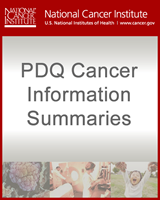From: Nutrition in Cancer Care (PDQ®)

PDQ Cancer Information Summaries [Internet].
Bethesda (MD): National Cancer Institute (US); 2002-.
NCBI Bookshelf. A service of the National Library of Medicine, National Institutes of Health.
| Drug Category | Common Drugs Used | Comments |
|---|---|---|
| Progestational agents | megestrol acetate | Multiple investigations report appetite stimulant activity and weight gain with use. Body composition of weight gain indicates increased body fat stores instead of lean body tissue. Increased risk of thromboembolism with doses >800 mg/day is an apparent trend. Studies suggest improved effectiveness in patients with better digestive function; therefore, targeted nutritional strategies such as digestive enzymes or elemental diets may be useful.[13,15] |
| medroxyprogesterone | ||
| Glucocorticoids | dexamethasone | Mechanism of appetite stimulation is unknown but likely related to anti-inflammatory and euphoric actions. Studies report positive but short-lived effects on clinical outcomes such as appetite and quality of life, with minimal or no effect on weight gain. Risk of adverse effects such as muscle wasting and immunosuppression limit use for long-term use for appetite stimulation.[13,16] |
| methylprednisolone | ||
| prednisolone | ||
| Cannabinoids | dronabinol | Inconsistent evidence of clinical effectiveness in cancer patients. Studies of dronabinol alone or with megestrol acetate have not shown superior benefit in promoting weight gain and appetite.[13,17-20] |
| Antihistamines | cyproheptadine | Not studied well in cancer patients. A randomized placebo-controlled trial in patients with advanced cancer reported no difference in weight changes and progressive weight loss in both groups. Sedation is a frequent adverse effect that may limit usefulness in cancer patients.[13,21] |
| Antidepressants/ antipsychotics | mirtazapine | Clinical data supporting routine use in cancer patients are lacking. Further studies are needed.[16] |
| olanzapine | ||
| Anti-inflammatory agents | thalidomide | All have been shown to decrease TNF-alpha. Mixed results in clinical trials regarding weight gain and appetite stimulation. One published randomized placebo-controlled trial evaluated the safety and efficacy of thalidomide, 200 mg daily, in patients with advanced pancreatic cancer and weight loss of at least 10% of premorbid weight. Thalidomide group showed a significant difference in weight loss compared with the placebo group, indicating the drug's ability to safely decrease weight loss and loss of lean body mass in the patients studied.[22] Preliminary clinical studies and laboratory studies of the polyunsaturated fatty acid EPA have suggested a benefit to cancer patients; however, subsequent large comparative studies failed to reproduce this benefit.[23,24] |
| pentoxifylline | ||
| melatonin | ||
| omega 3 fatty acids (EPA) | ||
| Metabolic inhibitors | hydrazine sulfate | Not approved by the U.S. FDA for marketing in the United States.[16] |
| Anabolic agents | oxandrolone | Used in an attempt to stimulate muscle anabolism. Limited published reports of successful appetite stimulation in cancer patients.[16] |
| nandrolone decanoate | ||
| fluoxymesterone |
EPA = eicosapentaenoic acid; TNF-alpha = tumor necrosis factor-alpha; U.S. FDA = United States Food and Drug Administration.
From: Nutrition in Cancer Care (PDQ®)

NCBI Bookshelf. A service of the National Library of Medicine, National Institutes of Health.